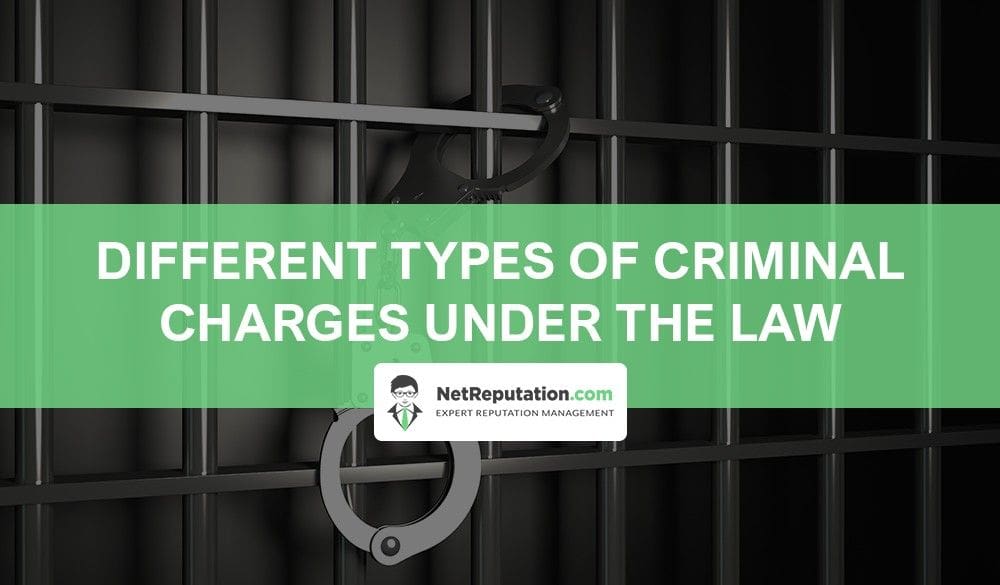Learn about the different types of criminal charges — felonies, misdemeanors, and infractions — in our complete guide to understanding how charges may affect your online reputation.
Criminal charges are the legal accusations made against individuals or entities for violating the law. These charges can range from minor offenses, such as traffic violations, to serious crimes, such as murder or fraud.
The types of criminal charges can vary depending on the jurisdiction, but they generally fall into three broad categories: infractions, misdemeanors, and felonies. Infractions are the least serious type of criminal charge, while felonies are the most serious.
Our guide is designed to provide an understanding the different types of criminal charges, which is important for both defendants and the general public, as it can help inform legal decisions and provide insight into the severity of criminal activity.
Get started with your free reputation consultation today
Felonies
Our first section is on the various types of criminal charges known as felonies. A felony is defined as:
“…a crime that is punishable by one year or more in prison or by death.”
Here is a more detailed look at the types of felonies based on degree of severity:
First-Degree Felonies
A first-degree felony is the most serious type of felony and is usually reserved for the most egregious criminal offenses. In general, first-degree felonies carry harsher penalties than lower-level felonies and can result in lengthy prison sentences, substantial fines, and other severe consequences.
While specific elements and penalties of a first-degree felony will depend on the particular offense and the laws of the jurisdiction where the crime occurred, typical examples of these felonies include:
- Murder
- Aggravated assault
- Rape
- Kidnapping
- Arson
- Large-scale drug trafficking
- Certain white-collar crimes such as embezzlement or securities fraud
First-degree felonies are considered to be among the most serious and harmful criminal offenses, and can have a significant impact on the lives of both the accused and their victims.
Second-Degree Felonies
Second-degree felonies are a category of criminal offenses that are less serious than first-degree felonies, but still carry significant penalties upon conviction. These offenses are generally considered to be more serious than misdemeanors and typically involve violence, theft, or drug-related crimes.
Here are some examples of second-degree felonies:
- Aggravated assault with a deadly weapon
- Manslaughter
- Robbery with a weapon
- Human trafficking
- Aggravated battery
- Burglary with assault or battery
- Felony DUI
- Stalking
- Possession of a controlled substance with intent to sell
- Fraudulent use of personal identification information
Penalties for second-degree felonies vary by jurisdiction, but can include prison sentences of up to 15 years, substantial fines, and other legal consequences. It is important to note that a conviction for a second-degree felony can have a significant impact on an individual’s future, including their ability to obtain employment, housing, and other opportunities.
Third-Degree Felonies
Third-degree felonies are criminal offenses that are less serious than first and second-degree felonies, but are still considered to be serious offenses. These crimes typically involve less severe violence, lower-value theft, and drug-related offenses.
Here are some examples of third-degree felonies:
- Aggravated stalking
- Battery on a law enforcement officer
- Possession of a firearm by a convicted felon
- Grand theft
- Fraudulent use of a credit card
- Possession of a controlled substance
- DUI causing serious bodily injury
- Aggravated white-collar crime
- Failure to register as a sex offender
Penalties for third-degree felonies vary by jurisdiction, but can include prison sentences of up to 5 years, substantial fines, and other legal consequences.
What are the Punishments for Felonies?
The punishments for felonies can vary depending on the severity of the offense and the jurisdiction in which the crime was committed. In general, felonies are considered to be more serious crimes than misdemeanors and carry more severe penalties.
Here are some common punishments for felonies:
- Imprisonment: Felonies typically carry a minimum prison sentence of one year, and can result in sentences of several years or even life in prison for the most serious offenses. The worse of these offenses may result in the death penalty.
- Fines: Convicted felons may also be required to pay fines, which can range from a few thousand dollars to hundreds of thousands of dollars, depending on the offense and the jurisdiction.
- Probation: In some cases, felons may be sentenced to a period of probation in lieu of or in addition to prison time. During probation, the individual must comply with certain conditions set by the court, such as regular check-ins with a probation officer or avoiding contact with certain individuals or locations.
- Loss of civil rights: Convicted felons may lose certain civil rights, such as the right to vote or own a firearm, depending on the jurisdiction and the offense.
- Restitution: In cases where a victim has suffered financial harm as a result of the offense, the court may order the defendant to pay restitution to the victim.
It is important to note that the punishments for felonies can vary widely depending on the jurisdiction and the specific circumstances of the offense.It is our experience that while felonies are the most serious of the types of criminal charges, any criminal conviction can result in long-term negative consequences, potentially damaging your digital reputation and public perception.
Misdemeanors
A misdemeanor is defined as:
“…a lesser crime punishable by a fine and/or county jail time for up to one year.”
While misdemeanors are considered less serious than felonies, conviction of a misdemeanor crime may result in imprisonment, fines, and loss of certain rights. A conviction can also hurt chances of employment or housing.
Here is a more detailed look at the types of misdemeanors based on their degree of severity:
First-Degree Misdemeanors
First-degree misdemeanors are a category of criminal offenses that are less serious than felonies but more serious than second or third-degree misdemeanors. These crimes are typically punishable by up to one year in jail, fines, or both.
Here are some examples of first-degree misdemeanors:
- Simple assault
- Theft or shoplifting (under a certain value)
- Criminal mischief
- Driving under the influence (DUI) with no bodily harm
- Possession of drug paraphernalia
- Reckless driving
- Disorderly conduct
- Resisting arrest without violence
- Trespassing
- Prostitution
It is important to note that the specific elements and penalties of first-degree misdemeanors can vary by jurisdiction.
Second-Degree Misdemeanors
Second-degree misdemeanors are a category of criminal offenses that are less serious than first-degree misdemeanors but still carry significant legal consequences. These offenses are typically punishable by up to 60 days in jail, fines, or both.
Here are some examples of second-degree misdemeanors:
- Simple assault (where no bodily harm is inflicted)
- Disorderly intoxication
- Petty theft (under a certain value)
- Possession of less than 20 grams of marijuana
- Certain invasion of privacy claims
- Trespassing on private property
- Harassment or stalking
- Driving with a suspended license
- Resisting arrest without violence
Again, specific elements and penalties of second-degree misdemeanors can vary by jurisdiction.
Third-Degree Misdemeanors
Third-degree misdemeanors are the least serious category of criminal offenses and are typically considered to be minor violations of the law. These offenses are typically punishable by fines and up to 60 days in jail, if incarceration is imposed.
Here are some examples of third-degree misdemeanors:
- Disorderly conduct (ex: loud or disruptive behavior)
- Simple possession of drug paraphernalia
- Loitering or prowling
- Trespassing on public property
- Minor traffic offenses (ex: driving without a license or registration)
- Minor in possession of alcohol
- Harassment or simple stalking
- Criminal mischief (damage of under a certain value)
These offenses are generally considered to be minor and often involve non-violent or low-level criminal activity.
What are the Punishments for Misdemeanors?
The punishments for misdemeanors can vary depending on the severity of the offense and the jurisdiction in which the crime was committed. In general, misdemeanors are considered to be less serious crimes than felonies and carry less severe penalties.
Here are some common punishments for misdemeanors:
- Incarceration: Misdemeanors typically carry a maximum sentence of one year in jail, although some jurisdictions may impose shorter sentences or no jail time at all.
- Fines: Convicted misdemeanants may also be required to pay fines, which can range from a few hundred dollars to several thousand dollars, depending on the offense and the jurisdiction.
- Probation: In some cases, defendants may be sentenced to a period of probation in lieu of or in addition to jail time. During probation, the individual must comply with certain conditions set by the court, such as regular check-ins with a probation officer or avoiding contact with certain individuals or locations.
- Community service: In some jurisdictions, convicted misdemeanants may be required to perform community service as a condition of their sentence.
- Loss of civil rights: Depending on the jurisdiction and the offense, convicted misdemeanants may lose certain civil rights, such as the right to vote or own a firearm.
It is important to note that the specific punishments for misdemeanors can vary widely depending on the jurisdiction and the specific circumstances of the offense.
Infractions
The term “infraction” has several meanings, but in general infractions are defined as:
“…violations or infringements; or breach of statutes, contracts, or obligations.”
Examples of Infractions
While specific elements and penalties of an infraction will depend on the particular offense and the laws of the jurisdiction where the crime occurred, typical examples of these infractions include:
What are the Punishments for Infractions?
Common examples of infractions include:
- Traffic violations, such as speeding or running a stop sign
- Jaywalking or crossing the street outside of a crosswalk
- Littering or dumping trash in public areas
- Violations of local noise ordinances
- Failure to obtain a required permit or license, such as a business license or building permit
- Public intoxication or disorderly conduct in public places
- Violation of leash laws or other pet-related ordinances
- Smoking in prohibited areas, such as indoor public spaces or designated non-smoking outdoor areas
- Violation of local curfews or loitering ordinances
- Minor violations of building codes or zoning regulations
In our experience, infractions are considered to be the least serious type of criminal charge and typically do not result in a criminal record. Mugshots may be taken during your interaction with law enforcement officials; if so, getting those mugshots removed from Google searches can help protect your online reputation.
No matter what, it is crucial to understand that ANY criminal charge – including something as seemingly minor as an infraction – can damage your online reputation and may result in long-term consequences as you work to achieve your personal and professional goals.
Key Takeaways
In covering the types of criminal charges and their consequences, we’ve touched on several key points:
- Felonies are the most serious category of criminal offenses and typically involve violent or serious criminal activity. They carry severe legal consequences, including lengthy prison sentences and substantial fines.
- Misdemeanors are less serious than felonies but still carry significant legal consequences. These offenses often involve non-violent or minor criminal activity and are punishable by fines and shorter jail sentences.
- Infractions are the least serious type of criminal charge and typically involve minor violations of the law, such as traffic violations or littering. They are typically punishable by fines and do not result in a criminal record.
It is important to understand that criminal charges and their penalties may vary by jurisdiction (local, state, or federal). It is also essential to know that criminal charges of any type can negatively influence how you are perceived as an individual or business owner.
Because your online reputation is so valuable, recovering from the reputational damage caused by a criminal conviction – no matter how minor – may require the assistance of a professional online reputation management team. These professionals work to restore your reputation with proven strategies and cutting-edge digital tools, allowing you to rebuild the reputation that means so much for your personal and professional lives.
Criminal Charges FAQs
The reputation repair team at NetReputation has fielded numerous questions about the types of criminal charges and what they mean for clients’s online reputations.
Here are some of the most frequently-asked questions:
What if someone doesn’t know the law and commits a crime?
If someone unknowingly breaks the law, they are still held accountable for their actions. Ignorance of the law is generally not considered a valid defense in most legal systems, including the United States. The principle “ignorantia legis neminem excusat” (ignorance of the law excuses no one) underlies this idea.
However, there are some instances where the specific knowledge or intent to commit a crime might be a factor in determining guilt or innocence. This is known as “mens rea” (criminal intent). In such cases, the prosecution must prove that the defendant had the requisite intent to commit the crime, depending on the types of criminal charges presented during a trial.
It is essential for individuals to familiarize themselves with the laws in their jurisdiction to avoid inadvertently engaging in illegal activities.
What is the difference between a prison and a jail?
Prisons and jails are both confinement facilities for individuals involved in the criminal justice system. Prisons, operated by state or federal governments, house convicted felons serving long-term sentences and focus on punishment, rehabilitation, and deterrence.
Jails, managed by local law enforcement agencies, temporarily hold individuals awaiting trial, sentencing, or serving short sentences for misdemeanors or lesser offenses. The primary differences lie in their purpose, administration, and inmate populations.
Are there other consequences for committing a crime?
Yes, there are other consequences for committing a crime besides prison time and fines. Some of these include:
- Probation: Instead of serving time in prison, a person may be placed under supervision in the community, often with specific conditions they must adhere to, such as meeting with a probation officer regularly, attending counseling, or performing community service.
- Community service: This requires the offender to perform unpaid work for a specified number of hours, benefiting the community or a designated organization.
- Restitution: Offenders may be required to compensate victims for any losses or damages caused by their actions, such as property damage or medical expenses.
- Rehabilitation programs: Offenders may be mandated to participate in programs aimed at addressing issues that contributed to their criminal behavior, such as drug or alcohol treatment, anger management, or mental health counseling.
- House arrest: In some cases, offenders may be confined to their homes, either for a specified period or during specific hours, and may be monitored using electronic devices.
- License suspension or revocation: For certain offenses, like DUI or driving-related crimes, an individual’s driving privileges may be suspended or revoked.
- Restraining orders: Offenders may be prohibited from contacting or being in close proximity to specific individuals, such as victims or potential victims.
- Loss of professional licenses: Some crimes may result in the loss of professional licenses, impacting an individual’s ability to practice in their chosen field.
- Immigration consequences: Non-citizens convicted of certain crimes may face deportation or denial of naturalization.
- Loss of civil rights: In some jurisdictions, convicted felons may lose certain civil rights, such as the right to vote or possess firearms.
These consequences can vary depending on the jurisdiction, the severity of the crime, and the individual’s criminal history.
Most importantly, a conviction for criminal activity can result in significant damage to a person’s online reputation, potentially standing in the way of employment opportunities, housing, financial services, or interpersonal relationships.
Contact NetReputation Today
Many people have made mistakes in their lives – mistakes that may have caused damage to their reputations. Depending on the types of criminal charges on your record, you may struggle to land that dream job, get a home or vehicle loan, or enter into a relationship with someone new.
NetReputation can help. Using proven strategies like negative content and image removal, branding, and content promotion, our online reputation management team can transform a bad reputation into one you can be proud of.
Call NetReputation today at 844-461-3632 or complete the form below to begin your free reputation analysis.


